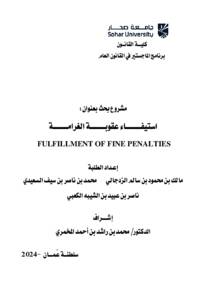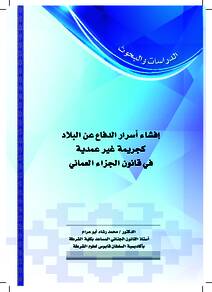وثيقة
عقوبة التكليف بأداء خدمة عامة في قانون الجزاء العماني بين الفاعلية والمشروعية.
الناشر
أكاديمية السلطان قابوس لعلوم الشرطة.
ميلادي
2021-06
اللغة
العربية
الملخص الإنجليزي
The Omani legislature has recently introduced community service penalty
by Article (57/ K) of the Penal Code, to keep pace with the development of
international standards regarding punishment and its objectives, since due to the
negative effects of short-term penalties, modern penal systems have tended to adopt
more effective alternatives in rehabilitation and reform, the most important of which
is the «community service penalty», which became widespread due to its social and
economic importance.
This study discusses the gaps in Article (57/ K) of the Omani Penal Code,
which vary greatly from what is established in international conventions and
comparative legislations, as it neglected to provide the essential provisions for
implementing community service penalty, such as the scope of its application,
its term, the type of services ordered, and the authority supervising its
implementation. All these shortages caused difficulty for courts to apply this
uncommon penalty, thus various contradictory judgments have been issued,
which sparked a wide legal debate about the effectiveness and legality of
community penalty.
The study concluded that in the light of the severe legislative deficiency that
Article (57/ K) suffers from, the criminal courts will probably continue to suffer
from resorting such Article in combating the criminal phenomenon, that contradicts
the current social and economic policy and the official desire to achieve financial
abundance for the state. Furthermore, as the convicts will be sentenced with different
type and amount of community penalty, the legitimacy of such punishment is
questionable. Consequently, legislative intervention is urgently required to complete
the missing provisions of Article (57/ K) and reform the community service penalty
in the Sultanate.
المجموعة
ISSN
2412-8317
URL المصدر
الملخص العربي
استحدث المشرع العُماني مؤخراً عقوبة التكليف بأداء خدمة عامة بموجب المادة )57/ك( من قانون الجزاء، ليواكب بذلك المعايير الدولية بشأن تطور العقوبة وأهدافها، إذ أنه بسبب الآثار السلبية للعقوبات السالبة للحرية قصيرة المدة، اتجهت الأنظمة العقابية الحديثة إلى تبني بـدائل أكثر فاعلية في التأهيل والإصلاح، مـن أهمها »عقوبة التشغيل االجتماعي« أو »الخدمة المجتمعية«، والتي ذاعت وانتشرت بسبب مزاياها الاجتماعية والاقتصادية. لعماني ويناقش البحث الثغرات التي شابت نص المادة )57/ك( من قانون الجزاء العماني هو مستقر في المواثيق الدولية والتشريعات المقارنة، عندما ً كثيرا الذي جاء مختلفا أغفل بيان الأحكام الأساسية لتنفيذ هذه العقوبة؛ كنطاق تطبيقها، ومجاالت تنفيذها، ومدة أدائها، وجهة الإشراف عليها، مما سبب صعوبة للمحاكم في تطبيق هذه العقوبة غير ً حول مدى فاعلية ومشروعية ً واسعا ً متباينة، أثارت جدال قانونيا المألوفة، فأصدرت أحكاما هذه العقوبة. وقد توصل البحث إلى أنه في ظل النقص التشريعي الحاد الذي تعانيه المادة )57/ك(،ستستمر معاناة المحاكم الجزائية عند اللجوء للنص الحالي لمواجهة الظاهرة الإجرامية، ً حدودها الدنيا والعليا، كما سيجعل المحكوم عليهم أمام نوع ومقدا ُ ر عقوبة ال تعرف مقدما ً لاستكمال أحكام المادة وهو ما يصطدم بمبدأ شرعية العقوبة، مما يقتض ً ي تدخال تشريعيا )57/ك( بما يؤمن عدم خروجها عما هو مستقر في السياسة الجزائية من أحكام عامة، ولتالفي آثارها في مجالي التطبيق والتنفيذ، وصولا إلى تطوير منظومة عقوبة التكليف بأداء خدمة عامة في السلطنة، بما ينسجم مع السياسة الاجتماعية والاقتصادية الحالية والرغبة في تحقيق وفرة مالية للدولة.
قالب العنصر
مقالات الدوريات



